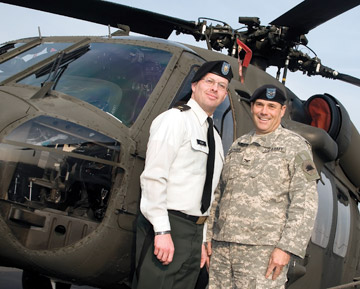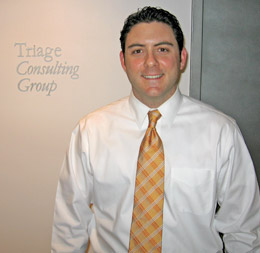Volume 24 · Number 3 · Spring 2007

Maj. Ken Koop í92 (left) and Col. Kenneth Selover í75, photographed at Mather Air Force Base in Sacramento, make a regular practice of hiring UC Davis interns for the California Army National Guard. Photo: Karen Higgins/UC Davis
Alumni
Career Boost
UC Davis alums assist the Aggies who follow behind by giving them a leg up into the working world.
A great internship can mean the world to a student. Such a position can enhance a student’s résumé and occasionally lead to full-time employment, but more importantly, it often gives insight into what a specific job entails. In many cases an internship offers a way for students to test-drive a career and gain real-world experience that can’t be found in the classroom.
Yet internships are highly competitive. UC Davis students compete for positions not just with their fellow Aggies, but with thousands of students from other local universities. To get a leg up on the competition and nab that perfect internship, it helps to tap connections.
Marg Lee, a coordinator with the UC Davis Internship and Career Center (ICC), says one of the most fruitful connections that students can make is with Aggie alumni in the working world. “Alumni know about the university, about the majors and about how competitive the campus can be,” Lee says. “This knowledge makes it easier for students to connect with future employers.”
According to Lee, the ICC places over 6,000 UC Davis students per year into internships. Although the ICC doesn’t keep statistics on how many of these internships result from a student-alumni connection, Lee notes that alumni are involved in “a good percentage of these” placements.
TAKE AN AGGIE TO WORK
The Cal Aggie Student Alumni Association (SAA) hosts many programs that bring students and alumni together. One such program is Take an Aggie to Work, which pairs alumni with students who are interested in their careers for a visit to the alumís workplace. Take an Aggie to Work is the final installment in a series of networking events that SAA hosts throughout the academic year. Students who receive general career advice at Aggie Diner in November then meet with alumni for informational interviews during the Take an Aggie to Lunch program in February. Take an Aggie to Work, held in May, is an opportunity for students to experience a day in the working world and build lasting relationships with alumni contacts.
A natural starting point for students looking to build a web of alumni contacts is through the Cal Aggie Student Alumni Association (SAA). Each year SAA hosts several networking events—such as Take an Aggie to Work (see adjacent article)—where students have the opportunity to connect with working alumni. Through these events students are encouraged to ask questions, build relationships and keep an open mind—because they may learn about a career they hadn’t previously considered.
College offers so much for every student, so many possibilities [and] so many doors to be opened—and yet as students we sometimes cannot see all of them,” says Toni Alejandria ’08, president of SAA. “Those are the moments when the advice and guidance of alumni can guide you further into what you are looking for.”
Hiring Aggies wherever he goes
The mentorship program is just one of the ways that alumni give students an entrée into the working world. Some alumni make a regular practice of hiring UC Davis students. One such alumnus is Col. Kenneth Selover ’75, of the California Army National Guard, who has been hiring UC Davis interns wherever he has worked for the past 28 years. To date Selover has hired more than 40 Aggies for paid, long-term internships.
Selover hired his first UC Davis intern in 1978 while he was serving as the air-pollution control officer for Placer County in Northern California. He was motivated to hire an intern in part because of the excellent experiences he’d gained through his own student internships—but also at the urging of his dentist, who asked Selover to hire his son, who was an Aggie.
Following the success of that first internship, Selover brokered a contract between Placer County and
UC Davis to establish an internship program. When Selover left Placer County for a position with NEC Electronics in 1987, he brought the UC Davis internship program with him. Four jobs later, Selover is still hiring Aggie interns.
“I am greatly indebted to the university,” notes Selover, a former environmental science major. “This program is one way to express my gratitude.”
Selover directs the Army National Guard’s Environmental Directorate Organization in Sacramento, which is charged with maintaining National Guard lands and facilities and protecting surrounding environments. He has been with the Environmental Directorate for seven years and has hired 10 UC Davis interns. Selover will be retiring this spring.
These interns are given varied responsibilities and often manage their own projects. “Our interns are not handled with kid gloves,” Selover says. “But they’ve excelled. Like most UC Davis students, they are classic overachievers.”
Maj. Ken Koop ’92, a former chemical engineering major who manages the National Guard’s internship program alongside Selover, said the investment in students pays off: “We have become embarrassingly dependent on [our interns] for our projects.”
The Army National Guard pays all of its interns, who are hired for two-year positions. Selover and Koop recruit through the ICC, which advertises the positions on campus and forwards all applications to them. According to Koop, they receive roughly six to 12 applications per posting and hire one or two interns per year.
Corinne Horn, an environmental policy, analysis and planning major who has interned with the Army National Guard since May 2005, notes that the program gives her a chance to apply what she learns in the classroom. “They give me projects that other places wouldn’t let interns do,” she says. “They put a lot of trust in me.” Horn is responsible for reviewing and approving all California National Guard unit restationing plans. Her duties include conducting environmental analyses.
Company ties
According to Lee, Selover’s example—the self-started internship program—is an unusual one. She says it is more common foralumni to act as a liaison for a company that hires concurrently at several universities. Companies have an easier time making connections if they use alumni as recruiters because they are familiar with a campus, Lee says.

Andy Stemmler í99 manages the UC Davis internship program for San Francisco-based Triage Consulting Group, which provides financial consulting to hospitals.
When Andy Stemmler graduated from UC Davis in 1999 with a degree in economics, he was hired through the ICC by San Francisco-based Triage Consulting Group, which provides financial consulting to hospitals.
Stemmler has remained with the company and now manages Triage’s UC Davis internship program. Since 1999, 65 Aggie students and alumni have been hired by Triage in internship roles or as full-time employees.
“Davis students are well-rounded and very good team players,” Stemmler says. “That’s why UC Davis is such a good school [to hire from].”
Triage hires one UC Davis intern each summer. The company also hires three graduating Aggie seniors per year—one each in fall, winter and spring. In addition to UC Davis, Triage hires interns from
UC San Francisco, UC San Diego, UC Berkeley, Stanford, Cal Poly San Luis Obispo, the University of Southern California and UCLA.
Triage has been especially satisfied with its UC Davis interns and alumni, Stemmler notes. Aggies, he says, stay with Triage for an average of three years.
Stemmler says that helping his fellow Aggies to advance their careers has been rewarding, and he encourages students to be as proactive as possible in seeking out connections with alumni. “It’s difficult for students to land an internship or a full-time job,” he says. “And alumni are a fantastic network to tap into.”
According to Lee, thousands of alumni like Selover and Stemmler are “very willing to help” UC Davis students and newly graduated alumni get an edge when applying for that perfect internship.
Neil Freese ’02 is CAAA’s communications officer.
